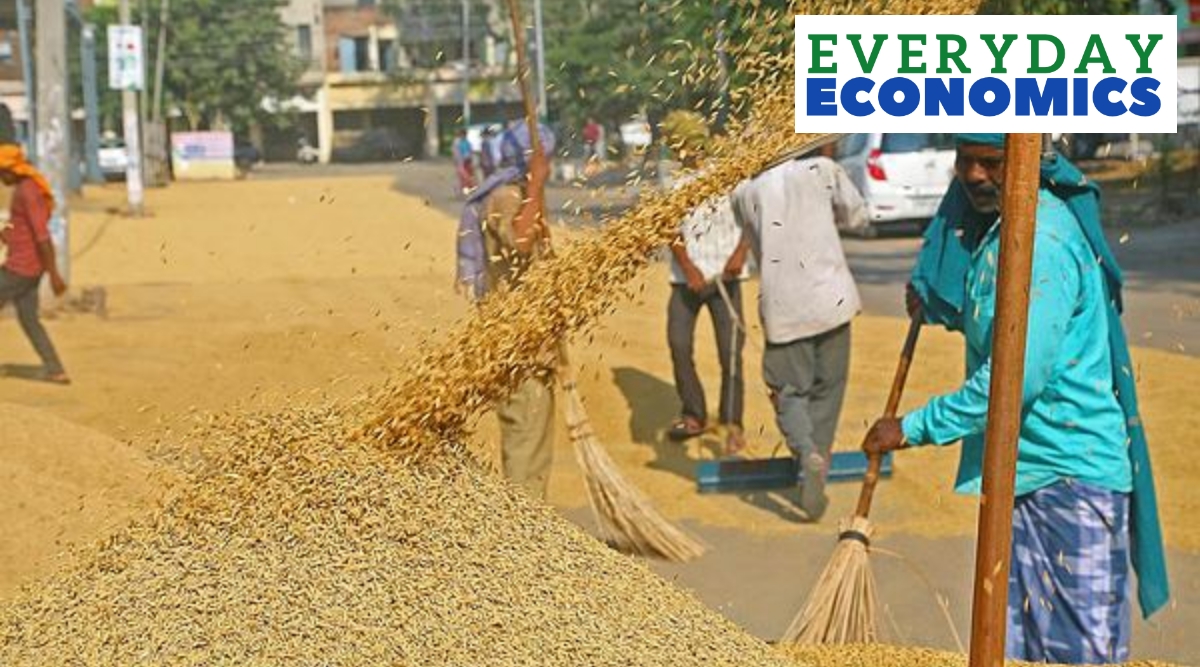Round the year, India’s farmers produce a host of agricultural commodities such as paddy (rice) in the kharif season (in which sowing happens in June and harvesting in November) or wheat in the rabi season (in which sowing happens in November and harvesting in March). For the most part, farmers sell their produce in the market.
Also in Explained | Explained: What meeting MSP demand would cost the government
But what if the prices in the market are too low to adequately remunerate farmers?

This can often happen if there is a bumper crop that season, or if the international prices of a particular commodity are quite low (and as such imports are very cheap).
In such a scenario, India’s farmers, who are already some of the poorest citizens of the country, will struggle to make ends meet. Apart from their individual troubles, if farmers give up farming as a result of low prices, it can even put the country’s food security at risk.
The so-called minimum support prices or MSPs announced by the government each year are a way to preempt such an eventuality.
During each cropping season, the government announces minimum support prices for 23 crops. Simply put, the MSP for a crop is the price at which the government is supposed to procure/buy that crop from farmers if the market price falls below it.
As such, MSPs provide a floor for market prices, and ensure that farmers receive a certain “minimum” remuneration so that their costs of cultivation (and some profit) can be recovered.
The MSPs serve one more policy purpose. Using them, the government incentivises the production of certain crops, thus ensuring that India does not run out of staple food grains.
Typically, MSPs create the benchmark for farm prices not just in those commodities for which they are announced, but also in crops that are substitutes.
Crops covered
Crops covered by MSPs include:
* 7 types of cereals (paddy, wheat, maize, bajra, jowar, ragi and barley),* 5 types of pulses (chana, arhar/tur, urad, moong and masur),* 7 oilseeds (rapeseed-mustard, groundnut, soyabean, sunflower, sesamum, safflower, nigerseed),* 4 commercial crops (cotton, sugarcane, copra, raw jute)
Best of ExplainedWomen's reservation: Seeds of the idea under Rajiv Gandhi and Narasimha Rao govtsWho was Hardeep Singh Nijjar, the Khalistani separatist that Canada PM Trudeau says India may have got killedBima Sugam: Is it a ‘UPI moment’ for insurance sector, and how will it benefit customers?Click here for more
How much?
Who decides what the MSP would be and how? The MSPs are announced by the Union government and as such, it is the government’s decision. But the government largely bases its decision on the recommendations of the Commission for Agricultural Costs and Prices (CACP).
While recommending MSPs, the CACP looks at the following factors:
Most Read 1Chandrayaan-3 mission: Dawn breaks on Moon, all eyes on lander, rover to wake up 2As Indo-Canadian relations sour, anxiety grips Indian students, residents who wish to settle in Canada 3Karan Johar says Sanjay Leela Bhansali did not call him after Rocky Aur Rani: ‘He’s never called me but…’ 4Gadar 2 box office collection day 40: Hit by Shah Rukh Khan’s Jawan onslaught, Sunny Deol movie ends BO run with Rs 45 lakh earning 5Shubh’s tour in India cancelled: Why is the Canada-based singer facing the music?
* the demand and supply of a commodity;* its cost of production;* the market price trends (both domestic and international);* inter-crop price parity;* the terms of trade between agriculture and non-agriculture (that is, the ratio of prices of farm inputs and farm outputs);* a minimum of 50 per cent as the margin over the cost of production; and* the likely implications of an MSP on consumers of that product.
Newsletter | Click to get the day’s best explainers in your inbox
All produce?
Also ReadChina’s ex-Foreign Minister Qin Gang removed over extramarital affair: Wh…Special session of Parliament: What Bills are likely to be introduced?What is the Vishwakarma scheme, launched for those engaged in traditional…A look at women representation in parliaments of 10 democracies
The government does not procure all farm produce at MSPs. Actual procurement (at MSP) varies with crop and geography. Also, MSPs have no statutory backing — a farmer cannot demand MSP as a matter of right. The farmer unions who led the yearlong agitation that led to the repeal of the three farm laws, want the government to enact legislation conferring mandatory status to MSP, rather than just being an indicative or desired price.
© IE Online Media Services Pvt Ltd



